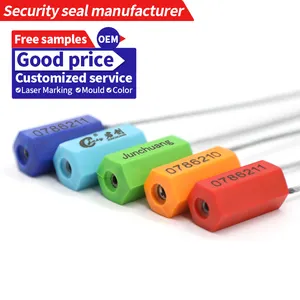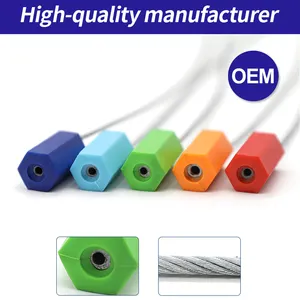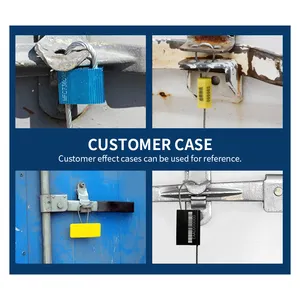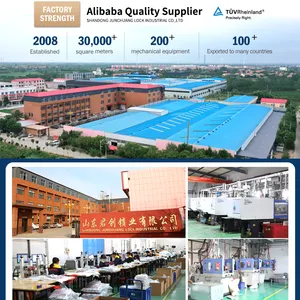
All categories
Featured selections
Trade Assurance
Buyer Central
Help Center
Get the app
Become a supplier

(34764 products available)









































Manufacturers produce container locks in multiple styles to meet the growing safety needs of shipping, storage, and transport containers. These customized locked containers not only secure valuable assets but also add an extra layer of complexity for thieves. The different varieties of these locks include key locks, combination locks, smart locks, and others discussed below.
Padlock locks are one of the most common types of container locks and are known for their ease of use. These locks are often secured with a heavy-duty padlock that can only be removed with a key or a combination. The padlock can be easily attached or detached from the locking mechanism on the container doors, providing quick access and simple installation. However, while padlock locks offer reasonable security, they can be vulnerable to picking, cutting, or hammering, depending on the type of padlock used. Thus, while they allow easy access, they may need to be complemented with other security measures to provide better protection against unauthorized entry. Customized padlocks can also be engraved or color-matched for branding purposes or visual consistency with security protocols.
However, for more security, manufacturers use a locking bar system which provides a more secure locking solution. This system has a locking bar that engages with the container doors and is secured by either a padlock or a built-in lock mechanism. The locking bar system is mounted on the container doors and spans both doors, creating an interlocking design that is much harder to pry open or forcibly removed. This system provides enhanced security compared with just using a padlock because of its robust construction and design. For businesses that require, a locking bar system can be customized to suit specific locking requirements, whether for size or nature needed to secure the contents in the container.
A super lock sealing system is designed to be a fool-proof locking mechanism to ensure that containers are not tampered with, or their contents are not stolen. It is often a color-coded, modular seal with controlled supply chain keys and various sensor options for monitoring. If an attempt is made to breach the lock, the system will trigger an internal mark, which will stain the cargo or destroy the lock, thus meaning the lock has been tempered and the contents are no longer safe. Super lock systems are mainly used by companies that move sensitive materials or legally required goods like pharmaceuticals, electronics, or high-value items as a deterrent to theft and tampering. Seals can be custom-made regarding measurements and design for particular clients or projects to improve container security further.
Manufacturers build a door lock and hasp system directly into the container, usually in the form of a steel hasp, where a padlock goes through to secure the doors. This system is designed to restrict access by securing the doors with a heavy-duty lock and hasp designed to withstand prying or abusive attempts. While easy to install and often low-priced, this system's security largely depends on the lock's quality. Customized door locks and hasp systems can be designed with a special lock type or configuration that meets certain security needs or prevents redundancy in other locking systems.
The container lock manufacturers use many customization options to enhance security and meet the specific needs of their clients. These include:
To some extent, the lock may include particular materials, shapes, and sizes to provide security that meets specific requirements or conditions. When they make such locks, they can be using stronger materials than steel or alloys or making them weather-conditioned to function optimally in a particular environment.
For fair security, many businesses request seals bearing distinct branding, such as company names or logos. This serves a two-fold purpose: it deters possible thieves who know such containers belong to a particular company, and it helps the said company trace its containers and cargo wherever they are in the world, as no one else will have such a seal.
Many suppliers offer color coding as a type of customization option for their locks, which works for organizational and security reasons. Many locks have different colors or patterns for their seals, making it easy to identify containers with different levels of cargo in transit or with easily perishable products in different containers. Color Coding seals helps people identify the locking systems with different levels of security or when locking different types of cargo, thus enhancing efficiency.
Keyway customization involves making unique key patterns or configurations to prevent combination locks or 'master keying' to use one key for several locks only to a certain container. This is particularly useful to a company in securing its shipments by making it harder for anyone with a generic or master key to access their cargo and possibly stealing it.
In some containers, manufacturers install sensors as part of the locking mechanism, which can be monitored. These sensors can tell when the lock is engaged or tampered with and notify people in ways such as locking the container or texting the container owner or manager. No such technology existed before, so it is safe to say that the only people who have sensor locking systems are clients willing to customize their orders further with technology and for a fee.
Various industries use customized container locks to secure their goods during transportation, storage, and shipping. These include the following:
Secure movement of goods is the core activity for the logistics and transportation industry, and that is why it uses container locks. They offer security to cargo that is being transported by truck, rail, and ship. Certain containers carry valuable, dangerous, or highly desirable goods, such as electronics, jewelry, or pharmaceuticals, and specialized locks help increase their safety and security during transit. For easier identification of containers, many logistics companies also choose color coding as part of the lock customization, which goes hand in hand with container management and tracking efficiency.
In manufacturing, raw materials and finished goods are transported and stored in containers, depending on the nature of the locked cargo inside the container. This is especially the case when dealing with machinery parts, chemicals, or other valuable inventory requiring secure locking systems. People working in areas prone to theft or tampering often seek customized locks, especially those with branding, further protecting them by making their products identifiable, thus giving them a hard time when they try to sell or use them without authorization.
Retail and distribution industries with supply chains and inventory management systems rely on container locks to secure their merchandise. These businesses sell electrical items, tools, and furniture, among other highly prized possessions, and that is why they have tailor-made locks fitted on their shipping containers to decrease the chances of theft. Customized locks also help these businesses track the locked containers easily and manage them efficiently within their warehousing and logistics networks.
In construction, tools, equipment, and sometimes building materials are secured with a locking device on a storage or shipping container, depending on the project's location and duration. Working on a project in an area with a dense population, for example, requires a container with a highly sophisticated locking system with a prying-resistant hasps or super locking mechanisms. Customizing the locks makes them easier to track and manage in logistics and projects while enhancing the security of resources used in the construction business.
Farmers and agribusinesses store seeds, chemicals, and equipment in containers that must be secured using customized locking solutions. Some agricultural products are expensive or regulated. For example, farmers have unique sealing systems that prevent tampering, give traceability to custom color codes, drug leaks, or contamination. Special locks that can withstand harsh environmental and weather conditions—like dust, water, or extreme temperatures—are often in demand in outdoor agricultural settings.
It is the many benefits provided by customized container locks that make them an important investment in transporting and storing goods, whether securely or otherwise. These benefits include:
A customized container lock provides businesses with enhanced security against unauthorized access and cargo theft. Since the manufacturer can design the lock around the business's specific security needs and the kind of risks that threaten them, locks dissuade thieves more than standard ones. Certain businesses use advanced locking technologies such as electronic locking, unique keyways, or color-coding systems to increase the level of security.
Many organizations today prefer customizing their container locks to convey brand messages as they store and transport their goods. Businesses can have their names, logos, or colors form part of the lock design. Both for security purposes as well as for marketing in a way that the brand name is out there, this also helps a lot in tracing or identifying the containers. As this is a form of advertisement, it helps create a distinct brand that has yet to be replicated.
Many businesses, such as those dealing with hazardous substances, must comply with strict regulations about securing shipments with proper locking mechanisms. Customized locks can be designed to meet these legal and safety requirements, ensuring that businesses comply with those who have set the rules. This will also help avoid legal issues, fines, and associated problems arising from non-compliance and increasing product safety during the process.
Customized container locks are designed to enhance efficiency in operations. For instance, businesses can establish master key systems to streamline container access or integrate electronic locks with real-time monitoring capabilities. This system reduces time spent managing multiple keys or dealing with lockouts and improves supply chain efficiency through prompt and automated security checks.
Lastly, customized container locks actually provide clients what they specifically requested: solutions that address their unique security concerns or more specific requirements. Suppliers usually assess the client's business needs, environment, and value of the content to design suitable locking mechanisms. Such an individual approach results in much better container security, as the locks used are not only practical but also very effective for particular use cases.
A1: Depending on the client's needs, customized container locks can be made of various materials, including stainless steel, aluminum alloys, and hardened brass.
A2: In most cases, companies lock their containers using practical or logistical considerations and the value of the goods inside and the kind of risks associated with security in their environment.
A3: A galvanized steel lock is appropriate for outdoor use as it is weather-resistant and rust-resistant.
A4: Many suppliers can design a master key system for businesses that need multiple containers to use a single key for efficiency.
A5: Regular checks to ensure debris is cleared and occasional lubrication will go a long way in ensuring the customized container locks work as they should.